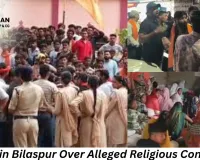Chhattisgarh’s ‘Master of Words’ Vinod Kumar Shukla Receives Jnanpith Award
Digital Desk

Celebrated Chhattisgarh writer Vinod Kumar Shukla was honoured with the prestigious Jnanpith Award, the highest recognition in Hindi literature, at his Raipur residence on Friday. Jnanpith General Manager R.N. Tiwari presented him with a statue of Goddess Vagdevi and the award cheque. Shukla is the first author from Chhattisgarh to receive this honour.
After accepting the award, Shukla remarked that at a time when concerns are often raised about threats to Hindi and other Indian languages, he remains hopeful. “I believe the new generation will respect every language and every ideology. The loss of a language or a good idea is, in a way, the loss of humanity,” he said.
Prime Minister Narendra Modi had also met Shukla recently during his visit to Raipur for Chhattisgarh’s 25th Foundation Day. During the interaction, Shukla had told the Prime Minister, “Writing is like breathing to me. I just want to return home soon and continue writing.”
Shukla, known for his gentle yet profound outlook, expressed gratitude to his readers and recited a poem during the ceremony. He said every person should attempt to write at least one book in their lifetime, and advised young readers to keep good literature close. “If you seek mastery in any field, you must turn to its finest works,” he said.
Speaking about criticism, he noted, “If someone criticises good work, that criticism can become your biggest strength. The best response to criticism of a poem is simply to write a better poem.”
Reflecting on his life, the author said failures, mistakes and criticism are part of every journey. “Even in chaos, something good is always scattered somewhere. When no one stands with you, walk alone. Hope is life’s greatest strength. Reading and writing are like breathing to me.” He then recited his noted poem Sabke Saath, which highlights the collective human spirit.
About Vinod Kumar Shukla
Born on 1 January 1937 in Rajnandgaon, Shukla has been writing for over five decades. His first poetry collection, Lagbhag Jai Hind, was published in 1971. His works, including Peड़ Par Kamra and Mahavidyalaya, are well regarded. His novels Naukar Ki Kameez, Khilega To Dekhenge and Deewar Mein Ek Khidki Rehti Thi are considered modern Hindi classics. Filmmaker Mani Kaul adapted Naukar Ki Kameez into a film.
Shukla has received numerous awards, including the Sahitya Akademi Award (1999), Raza Award, Muktibodh Fellowship, and most recently the PEN/Nabokov Award, becoming the first Asian writer to receive it.
About the Jnanpith Award
The Jnanpith Award, instituted in 1965 by the Bharatiya Jnanpith Trust, is India’s highest literary honour. It is awarded to writers working in any of the 22 languages listed in the Eighth Schedule of the Constitution. The honour includes ₹11 lakh, a citation, and a bronze Vagdevi statue. The first award was presented to Malayalam writer G. Sankara Kurup in 1965.











